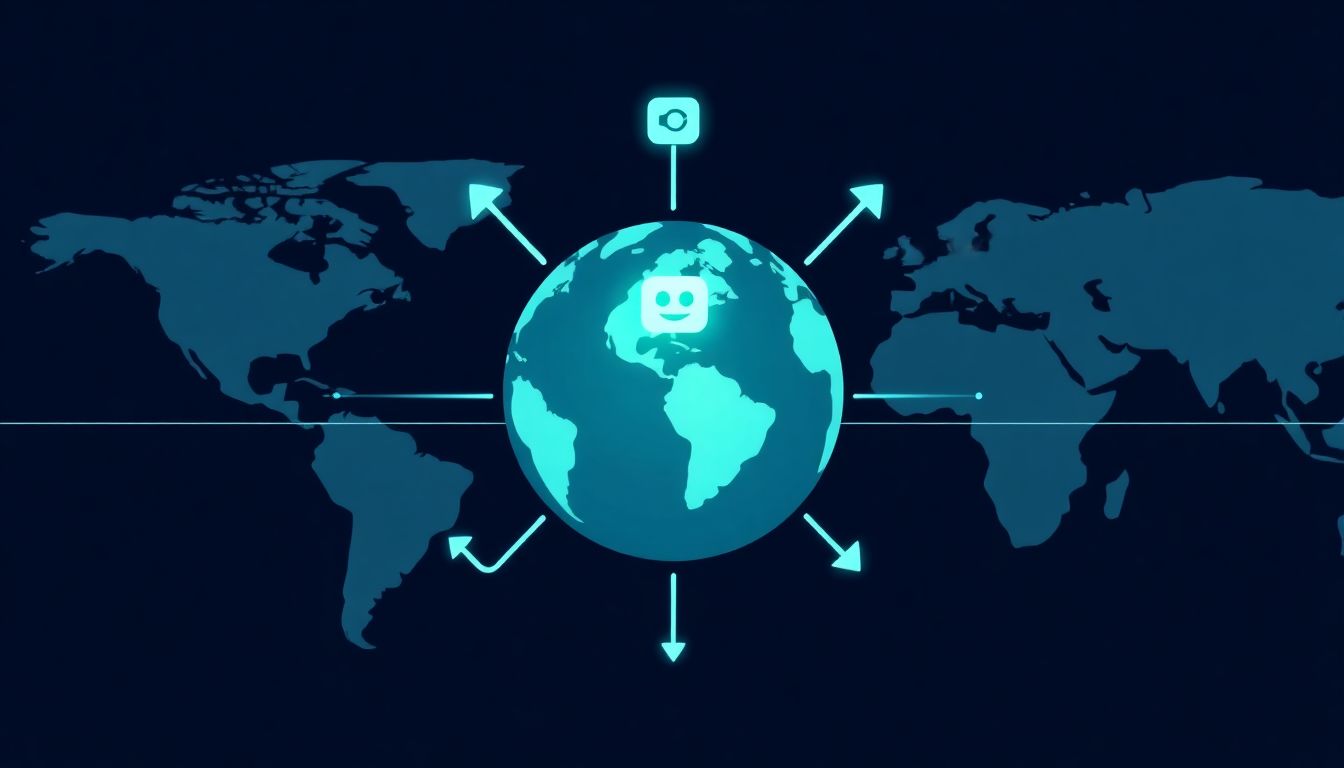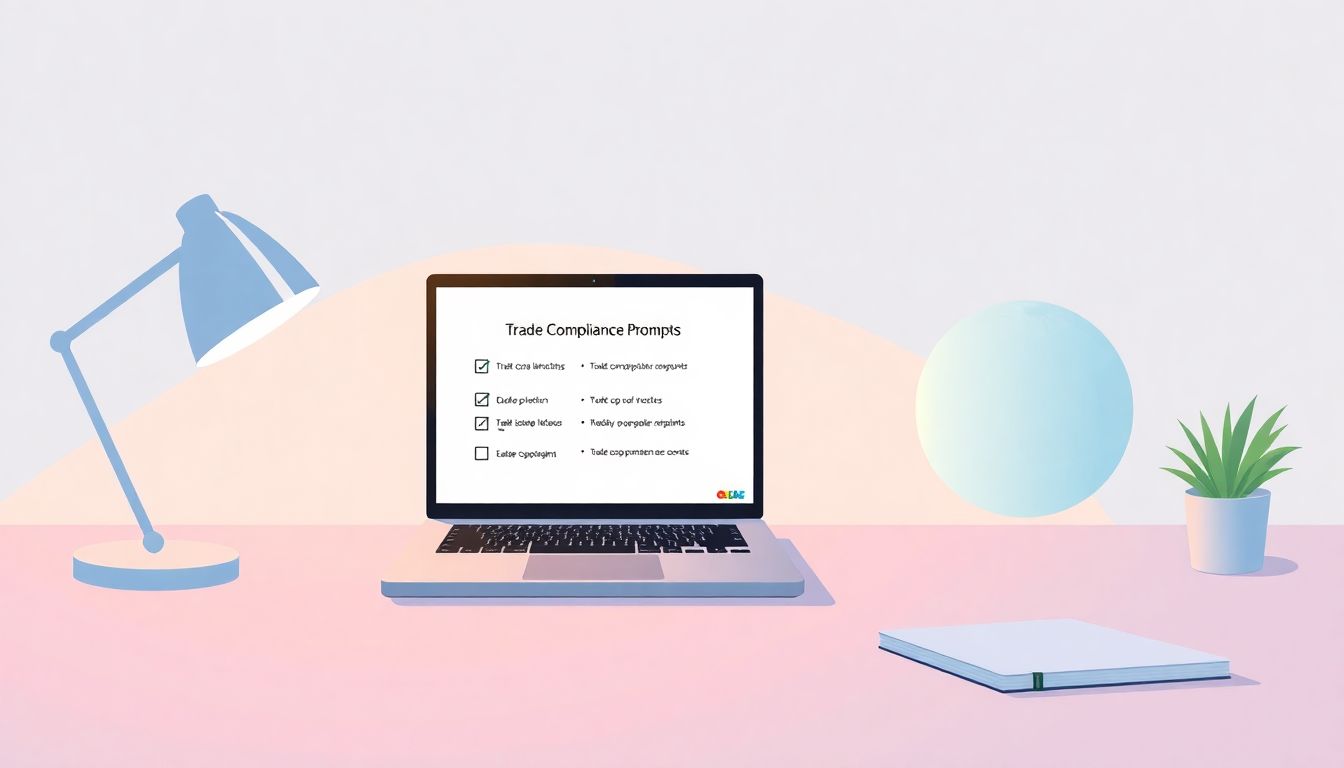Navigating the maze of international trade compliance can feel overwhelming, right? With all the regulations, policies, and paperwork, it’s easy to get lost in the details. You’re definitely not alone in feeling this way—many businesses struggle to ensure they’re staying compliant while also trying to stay competitive.
But what if I told you there’s a way to simplify this process? By using tailored ChatGPT prompts, you can tackle compliance challenges head-on, saving you time and effort. Stick around, and I’ll share practical prompts that can become your trusty sidekick in understanding and managing trade regulations.
From generating essential documentation to training your staff, the capabilities are immense. Let’s dive in and explore how you can leverage these prompts for smooth sailing in international trade compliance!
Key Takeaways
- Use tailored ChatGPT prompts to simplify international trade compliance.
- Ask direct questions to clarify regulations and common pitfalls.
- Break down compliance assessments into manageable steps using specific prompts.
- Leverage ChatGPT for generating needed documentation and reports efficiently.
- Stay updated on trade policies by querying for recent changes and setting alerts.
- Address common compliance challenges with targeted inquiries for solutions.
- Enhance staff training on trade regulations using structured prompts and materials.
- Maximize efficiency in compliance processes with automation and best practices suggestions.

Essential ChatGPT Prompts for International Trade Compliance
If you’re navigating the complex world of international trade compliance, ChatGPT can be an invaluable resource. Here are some essential prompts to get you started.
- “List the key regulations I need to be aware of for international trade compliance.”
- “Summarize the main requirements for exporting goods to [Country].”
- “Identify common pitfalls businesses face in trade compliance.”
- “What are the penalties for non-compliance with international trade laws?”
Using these prompts can help you understand the landscape of trade regulations better, allowing for smoother compliance processes.
How to Use ChatGPT for Understanding Trade Regulations
Understanding trade regulations is crucial, and ChatGPT can guide you through the maze. Start by asking direct questions.
For instance, prompt ChatGPT with, “How can I utilize ChatGPT to grasp international trade regulations?” This will kickstart an informative dialogue on trade rules.
Follow it up with specific questions like:
- “What are the trade restrictions when importing goods into the U.S.?”
- “Explain the difference between tariffs and trade quotas.”
This approach enables you to gain clarity on each aspect of the regulations, making compliance a lot more manageable.
Step-by-Step Prompts to Assess Compliance Requirements
Assessing compliance requirements is a systematic process. Here’s a simple step-by-step method to tackle it using ChatGPT.
Begin with a broad inquiry: “What is a step-by-step guide to assess trade compliance requirements with ChatGPT?” This sets the stage for a complete overview.
Follow this up with detailed prompts like:
- “List the documents needed to assess compliance for exporting to [Country].”
- “What compliance checks should I perform before shipping products internationally?”
By breaking down the process, you’ll find it easier to understand and complete each compliance requirement step.
Prompts for Generating Documentation and Reports in Trade
Generating the necessary documents and reports for international trade can be tedious, but ChatGPT can help. Focus on creating clear and concise documentation.
Start with the prompt, “What ChatGPT prompts can assist in generating trade compliance documents?” This will lead you to actionable templates.
You might also find it helpful to ask:
- “Generate a checklist of required documentation for importing electronics into the EU.”
- “Draft a compliance report for a recent shipment to [Country].”
Utilizing these prompts enables you to streamline your documentation process and ensure that you meet compliance standards with ease.

Using ChatGPT to Stay Updated on Trade Policy Changes
Keeping up with ever-changing trade policies is crucial for compliance.
ChatGPT can be a handy tool in monitoring these updates efficiently.
Start with a prompt like, “What are the latest updates in international trade policies?”
This will provide you with a comprehensive overview of recent changes.
You can also ask for specifics by entering:
- “Summarize changes in tariffs for imports from [Country].”
- “What new trade agreements have been established in the past year?”
Additionally, ask ChatGPT to set up alerts by using prompts like:
- “Create a schedule for weekly updates on trade compliance regulations.”
- “List key resources for monitoring changes in international trade laws.”
Using these prompts will help you stay informed, ensuring compliance and smooth operations.
Common Compliance Challenges and Corresponding Prompts
Every business faces challenges in trade compliance, but solutions are just a prompt away.
Start by identifying specific issues with a question like, “What are common compliance challenges in international trade?”
After pinpointing the challenges, you can ask for targeted solutions using prompts such as:
- “List strategies for overcoming shipping delays due to regulatory checks.”
- “What steps can I take to avoid penalties for non-compliance?”
You can also seek insights on handling documentation issues by asking:
- “How can I streamline my documentation process for exports?”
- “Provide tips for ensuring accurate customs declarations.”
By addressing these common challenges through informed prompts, you can navigate compliance hurdles more effectively.
Prompts for Training Staff on International Trade Compliance
Training staff on international trade compliance is essential for organizational success.
Using ChatGPT can enhance the training process significantly.
Begin with a prompt like, “What are effective methods for training staff on trade regulations?”
Follow this up with more specific requests, such as:
- “Create a training outline for new employees on trade compliance.”
- “List essential topics to cover in a trade compliance workshop.”
You can also utilize ChatGPT to draft interactive training materials with prompts like:
- “Develop a quiz for staff on international trade laws.”
- “Generate case studies to discuss common compliance scenarios in training sessions.”
Investing time in training with these prompts will empower your team and strengthen your compliance efforts.
Maximizing Efficiency in International Trade Compliance with ChatGPT
Making trade compliance efficient is vital in today’s fast-paced global market.
ChatGPT can assist in streamlining your processes.
Begin by asking, “How can I improve the efficiency of my trade compliance operations?”
Follow up with detailed prompts to enhance specific areas, such as:
- “List tools that can help automate compliance tasks for international trade.”
- “What are best practices for managing trade documentation efficiently?”
You might also consider asking for optimization techniques like:
- “Suggest ways to reduce the time spent on compliance checks.”
- “How can I use AI to improve accuracy in trade compliance reporting?”
By implementing these strategies, you can not only enhance efficiency but also ensure robust compliance in international trade.

Real-World Examples of Effective Prompts for Trade Compliance
Seeing practical applications can really drive home the effectiveness of using ChatGPT for international trade compliance.
For instance, consider a prompt like, “Provide examples of successful trade compliance strategies used by leading companies.”
This question can yield insights into how major players navigate the compliance landscape.
You might also ask, “What prompts do companies use for weekly compliance checks?” for a hands-on approach to regular monitoring.
Another useful prompt could be, “List industry-specific compliance challenges and how businesses overcame them.”
Through these examples, you can learn how to implement similar strategies in your own operations.
Also, consider asking:
- “Compile prompts that helped companies avoid penalties in international trade.”
- “Share case studies of organizations that streamlined their compliance process with ChatGPT.”
Real-world examples not only illustrate effectiveness but also inspire confidence in adopting ChatGPT as a compliance tool.
FAQs
Essential prompts can include inquiries about specific trade regulations, compliance checklists, documentation requirements, and ways to adapt to policy changes to ensure adherence to international trade laws.
To generate compliance documentation, prompt ChatGPT with details about the required documents, business specifics, and regulatory standards to create tailored reports and forms relevant to your trade activities.
ChatGPT can assist in creating training modules, quizzes, and scenario-based learning materials that cover international trade regulations and compliance protocols, making it easier to educate your staff effectively.
Common challenges include understanding complex regulations, maintaining updated documentation, adapting to frequent policy changes, and ensuring all staff are adequately trained in compliance protocols.
